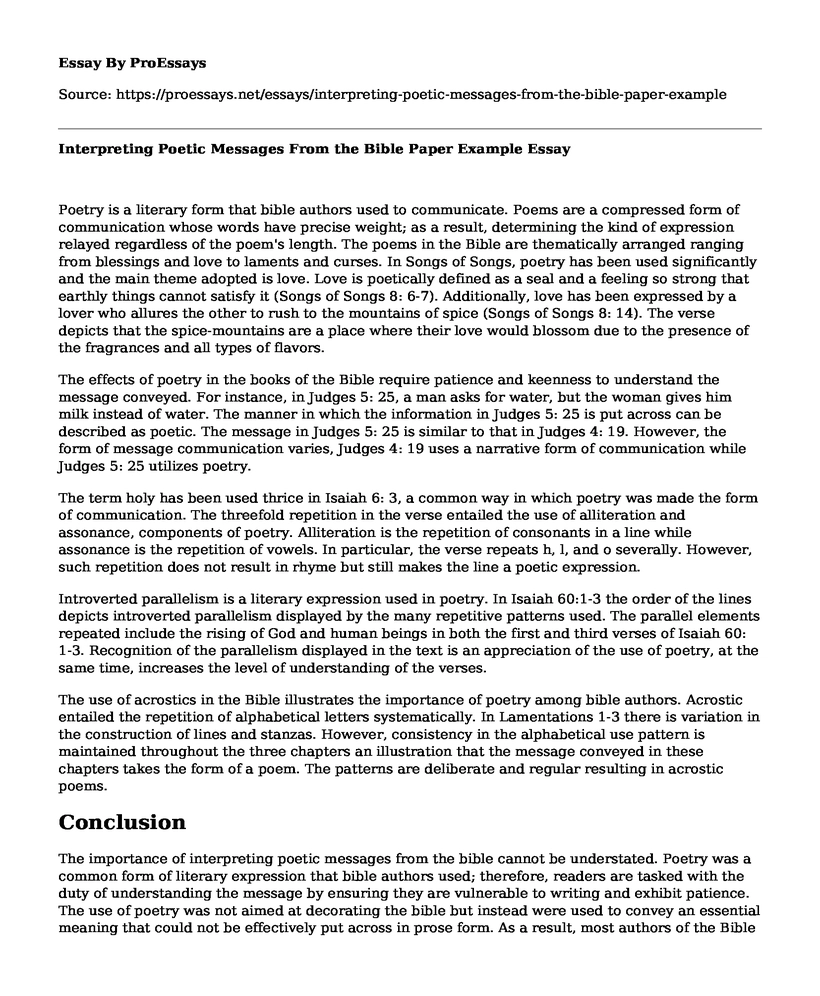Poetry is a literary form that bible authors used to communicate. Poems are a compressed form of communication whose words have precise weight; as a result, determining the kind of expression relayed regardless of the poem's length. The poems in the Bible are thematically arranged ranging from blessings and love to laments and curses. In Songs of Songs, poetry has been used significantly and the main theme adopted is love. Love is poetically defined as a seal and a feeling so strong that earthly things cannot satisfy it (Songs of Songs 8: 6-7). Additionally, love has been expressed by a lover who allures the other to rush to the mountains of spice (Songs of Songs 8: 14). The verse depicts that the spice-mountains are a place where their love would blossom due to the presence of the fragrances and all types of flavors.
The effects of poetry in the books of the Bible require patience and keenness to understand the message conveyed. For instance, in Judges 5: 25, a man asks for water, but the woman gives him milk instead of water. The manner in which the information in Judges 5: 25 is put across can be described as poetic. The message in Judges 5: 25 is similar to that in Judges 4: 19. However, the form of message communication varies, Judges 4: 19 uses a narrative form of communication while Judges 5: 25 utilizes poetry.
The term holy has been used thrice in Isaiah 6: 3, a common way in which poetry was made the form of communication. The threefold repetition in the verse entailed the use of alliteration and assonance, components of poetry. Alliteration is the repetition of consonants in a line while assonance is the repetition of vowels. In particular, the verse repeats h, l, and o severally. However, such repetition does not result in rhyme but still makes the line a poetic expression.
Introverted parallelism is a literary expression used in poetry. In Isaiah 60:1-3 the order of the lines depicts introverted parallelism displayed by the many repetitive patterns used. The parallel elements repeated include the rising of God and human beings in both the first and third verses of Isaiah 60: 1-3. Recognition of the parallelism displayed in the text is an appreciation of the use of poetry, at the same time, increases the level of understanding of the verses.
The use of acrostics in the Bible illustrates the importance of poetry among bible authors. Acrostic entailed the repetition of alphabetical letters systematically. In Lamentations 1-3 there is variation in the construction of lines and stanzas. However, consistency in the alphabetical use pattern is maintained throughout the three chapters an illustration that the message conveyed in these chapters takes the form of a poem. The patterns are deliberate and regular resulting in acrostic poems.
Conclusion
The importance of interpreting poetic messages from the bible cannot be understated. Poetry was a common form of literary expression that bible authors used; therefore, readers are tasked with the duty of understanding the message by ensuring they are vulnerable to writing and exhibit patience. The use of poetry was not aimed at decorating the bible but instead were used to convey an essential meaning that could not be effectively put across in prose form. As a result, most authors of the Bible considered it as a primary mode of communication.
Works Cited
Ibs. Holy Bible: New International Version. Great Britain: Biblica, 2011. Print.
Cite this page
Interpreting Poetic Messages From the Bible Paper Example. (2022, Sep 22). Retrieved from https://proessays.net/essays/interpreting-poetic-messages-from-the-bible-paper-example
If you are the original author of this essay and no longer wish to have it published on the ProEssays website, please click below to request its removal:
- I Felt a Funeral, in My Brain by Emily Dickinson - Literary Analysis Essay
- Essay Example on Religious Symbolism: Jesus in the Last Supper Murals
- Essay on Man vs. Man: The Fight for Survival in Lord of the Flies and The Most Dangerous Game
- Changes in Macbeth's Character Essay
- Assignment Example on German Romanticism
- Othello: The Unveiling of Pride and Its Consequences - Essay Sample
- Essay Example on Roman Influence







